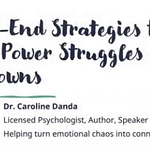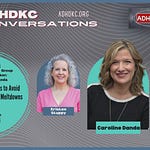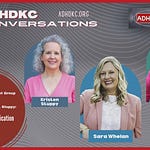Dive Into ADHD Insights with Lauren Dreher
We’re thrilled to share a special episode of the ADHDKC Conversations podcast, featuring Lauren Dreher! Lauren is an inspiring advocate for ADHD awareness, the author of Go With Your Gut, Then Keep Going, and the co-host of the Misfits Managed podcast.
An update since the podcast was recorded: Lauren will be helping with our ADHDKC Women’s Group, so we need to extend an extra special welcome to her! We’re looking forward to working with her even more.
In this episode, ADHDKC’s Kristen Stuppy dives into Lauren’s journey as a late-diagnosed ADHD adult. Together, they discuss Lauren's mission to empower women with ADHD, strategies for thriving in life, and insights into managing relationships and routines.
🎧 Listen to the podcast now on your favorite streaming service or watch the video above to get a glimpse of Lauren’s unique perspective and why you won’t want to miss her upcoming talk!
Save the Date
💡 How to Motivate Kids with ADHD to Learn When They Don’t Care
🗓️ January 14, 2024
⏰ 6:30–7:30 PM CST
📍 Online Event
Register at ADHDKC.org under the Events tab or from the button below.
Let Lauren inspire you to see ADHD in a new light—this is just the start of what promises to be a fantastic conversation in January!
Transcript
As always, this is AI generated, so excuse the errors!
Kristen Stuppy (00:01.981)
Hello and welcome to the ADHDKC podcast, ADHDKC Conversations, where we explore topics that matter to the ADHD community. I'm Kristen Stuppy and today I am super excited to announce Lauren Dreher. Lauren's the author of Go With Your Gut, Then Keep Going, and a podcast host to her podcast, Go With Your Gut, and then a podcast co-host to Misfits Managed. She's going to be joining us for the upcoming parent talk.
on January 14th for a topic that comes up a lot with parents of kids with ADHD, how to motivate them to learn when they don't care. And that online event will be held on January 14th from 6.30 to 7.30 Central Time. And you can register anytime at ADHDKC.org under the events tab. But today we're lucky enough to have Lauren right here on the podcast for an exclusive chat. So let's dive in. I want to welcome Lauren to the show. I'm very thrilled to have you here.
And I want to start with your journey. Your LinkedIn services list is like this long. Educational consulting, leadership development, life coaching, corporate training, public speaking, team building, diversity and inclusion, change management. It's a diverse set of services. And your mission is to help working women with ADHD embrace their differences so they can use them to lead and thrive. So how do you feel the variety of services helps you motivate to follow your mission?
Lauren Dreher (01:27.19)
I honestly, I think it would show people that it's okay to have tons of interests. And I find it a lot with people who have ADHD and it because we're always curious, we're always looking at things and we're always pulling up our phone and be like,
don't know what that means, let me look it up real quick, or let me figure out how to do something. And then all of sudden, it's like, okay, squirrel, you know, I have to go look up something to figure out how to do this. And then, you you go down that rabbit hole and all of sudden, new skill, yay. And honestly, I don't think a lot of people give themselves credit.
or really think about the fact that learning all of that stuff can absolutely translate into new skills, different skills. And all of the things that I do, lots of them have just come from dabbling in stuff and saying, I'm gonna figure this out.
and lots of different interests. Some of them have nothing to do with being who I am professionally. Some of them have nothing to do with my personal life, which sometimes does merge. But I think especially as women, men too, but as women, if we don't have a formal piece of paper to tell us that
we have a skill or a certification, then we automatically assume it doesn't matter. I'm like, no, I don't need a piece of paper to tell me what I can do, what I can learn and what I know. That may be great for some people who need credentialing or whatever it is, but you don't need...
Lauren Dreher (03:50.298)
You don't need a piece of paper or something to tell you how good you are. So I wanna show women, help women discover how much potential honestly they really have. And the fact that they have ADHD,
or have a relationship with somebody who does, help them understand themselves and what that can mean for them, but also help them understand those people in that relationship because it's hard.
Kristen Stuppy (04:34.641)
you know, it sounds like you're led by your curiosity, which feeds our dopamine, which is perfect for somebody with ADHD. And then you can learn and follow that path for as much as it gives you. And then if you find something else interesting along the way, squirrel, go to that.
Lauren Dreher (04:49.37)
you
You know, I've gotten your comment a lot of like, that's a lot. And you're right. It is. I think the thing is that we can do a lot. But most of it really is just being curious. And it's really interesting how different
things and different skills translate into multiple areas of our life. And a lot of times, I mean, we give them terms, some people give them other terms, doesn't matter what it is, that can translate into a lot of different things. And I mean, heck, you type something into a search bar somewhere and it's okay, what's latest trending word or whatever and okay.
I can do that. This is what you meant? Okay, yeah, I can do that too.
Kristen Stuppy (05:55.635)
So yeah, what do you think has been the most rewarding aspect of all the things that you have done?
Lauren Dreher (05:56.75)
Yeah.
Lauren Dreher (06:06.33)
for myself rewarding.
Learning to trust myself to figure it out. I am a very late diagnosis with ADHD. I found out when I was
34 I want to say. So it answered a lot of questions for me, but it also it connected so many dots of why, what are these pieces of me that make me feel like I don't ever finish something or make me feel like I'm stupid or
Why do I think like this? Why do I act like this? And so the most rewarding thing honestly has been me being able to start to trust myself because I know myself better and I know why I work the way I work and giving myself the grace to say, well, giving myself the grace but also
learning how to set up the tools and the support system to then help me finish it or maybe not even just be as hard on myself as to what happened, why I didn't finish it, or the fact that it just like fell off my plate because I put something else on it. I will say that it is really rewarding
Lauren Dreher (07:59.596)
working with people and being able to see those light bulb moments of them connecting the dots that I connected and being like, this makes so much sense. This is why this happened. This is why. And then being able to say, you know, let's figure out how to use this as a strength, not use it as an excuse because
A lot of people are like, yeah, you know, that's my dang ADHD when yeah, okay, it could be, but there are so many good things that come from it as well as the struggles.
Kristen Stuppy (08:43.934)
Yeah, you know, I know a lot of adults who don't have a diagnosis yet, or maybe suspect they have a diagnosis. Sometimes after the diagnosis, all of those years of insecurities and failures and feeling like they let others down or let themselves down, it can be very validating to get that diagnosis.
Lauren Dreher (08:58.509)
Yes.
Lauren Dreher (09:05.57)
You know, the way I would describe it is I knew something was there. I knew there was a reason, but I had no idea what that reason was. multiple people had been like, hey, Lauren, have you ever thought about the fact that you might have this? And I kind of laughed it off at first because I was like, no, don't. No, because it has that disorder labeled to it. And I was like,
I don't have a disorder. What are you talking about? And honestly, I just didn't know what it was. And it was like, no, why would I have that? then I started hearing some of the people that I followed for different reasons on social media, like figure it out for themselves. And they're like, if you do this, this, this, and this, could be you. So one day I got curious and I was just like,
Let's just see. Let's just see. Like with a five second Google search, let's just see. What does it say? And then I looked at, I sat there and I was just like, some of those people might've been right. Okay. But it's crazy because it was, I ended up going to,
psychologist, psychiatrist, whichever one it is, I can never remember. And honestly, had, I got myself diagnosed, made the appointment, there was no doctor referral, nothing. And I was just like, I think this might be a thing. And he started just asking me questions about what I do, how I do things and
Within 15 minutes after other people were, non clinician people, just people that I've been around after I'm like, Hey, I'm going to go get diagnosed for this. They're like, I think you're overthinking it. And I'm like, well, I'm not allowed to die. Somebody with a license, tell me that. So here you go. Within 15 minutes, he's like, yeah. Yep. This is you. And once I knew it, it was like me.
Lauren Dreher (11:28.734)
in a room with this little like little person that's how I pictured it with a little person running out with a costume on like hiding from me like I knew it was there but I didn't know who it was or what it was and then after as much as it was nice that after I found out I could connect dots it was still overwhelming because now I'm like
how the heck do I deal with this? How do I manage it? Like I have two million more questions. But it was like this little person like, all right, I'm gonna throw off my math, throw off my costume. You know I'm here now. So like, let's go absolutely crazy. And because it's that like flood of information and it's overwhelming. And I was just like, okay.
And now I'm like, how do I structure things? So it took a while for that too, but it wasn't, it was like an aha moment, but it was also like, almost sent my nervous system into like paralysis. Cause I'm like, my God, how do I do this now? Like, what is this? How do I do this? And I'm still in a learning curve. Let's be honest. Yeah.
Kristen Stuppy (12:48.295)
Aren't we all? Aren't we all? And for those who might be somewhere further down the path, haven't quite gotten to the steps that you're at now, how do you, what do you think your number one advice for them to be to manage some of the challenges with or without a diagnosis? How do you feel people can start to take control and learn to thrive with it?
Lauren Dreher (13:19.526)
I'm going to throw this out there. No, this is just my experience. talk to doctors, talk to, people with it because I will throw out medication. I take medication. I did not want to.
My husband has been a, he's known he's had it since he was early. Not fair. He does not. And it is to each their own. I originally said I don't want to, but it has helped me in the fact that it just, it calms me down and doesn't change who I am. And it is the lowest
dose of anything because it is just enough to help me manage. It's worth the conversation, whether it is something you decide to pursue or not. The other thing I would say is don't be afraid to talk about it. We were just talking about how like it really overwhelmed me and I feel like there's such a stigma around it of like
Let's not talk about this. nobody wants to know. I don't want to tell anybody that I have a disorder and the world of ADHD is so supportive, full of information and you would be shocked at how many people would be like, I have it too. This is what I do. because it's individual, it's not going to look the same on anybody.
And that's based on like literally everything.
Lauren Dreher (15:22.938)
Talk to people about it. Talk about experiences so that you don't feel as lonely or if you are somebody who is in a relationship, has a child with it and you don't, be patient. Be patient and ask questions. I say that because
When it's just a piece of you, you don't know that other people do not think the same way.
Lauren Dreher (16:04.459)
I
leave, I lose my train of thought as you could see, I leave my organized piles of everywhere because if you put it away, it'll be out of sight, out of mind, it won't happen. I won't do it. My husband is not like that. is very, everything has a place, please put it away, clutter, he can't handle clutter. And so we have this,
dynamic of he used to think that I was Trying to make him mad because I left stuff out and I'm like no I'm not trying to make you mad It is because if it is not sitting out to remind me to do it. It will not happen And Since I have gotten diagnosed and it is he's like, okay. This is you too
Our communication structure has drastically changed and much more understanding. He used to tell me that I couldn't handle being in his brain and I kind of want to be like, I don't think you can handle being in mine. And now it's a point of, we can't handle being in each other's because they're going 90,000 miles an hour, but
Kristen Stuppy (17:20.743)
you
Lauren Dreher (17:31.682)
in the way that we do, because we do not work in the same way.
Find structure, find routine. Even if you are somebody who needs a very general routine, find some sort of routine and then, I don't know, be open to what it looks like for you. One of the biggest things that I learned about myself was I...
need downtime. I usually tell people I'm about 20 % introvert, 80 % extrovert. I love being around people. I love obviously talking to people. I love being social, but about in the morning I have to have my downtime where it is silent pitch black and I can be in my own head and organize my head to know here's what I need to do today.
I need the same thing about halfway through. I need time to decompress. Some people need loud music for that. I have to have complete silence. If I have loud music, I will be singing to music instead of organizing my thoughts. And then I get overstimulated really easy and I've learned what my body does when I'm overstimulated.
And now I know how to help myself with it and I know what I need. But that's gonna look different for everybody just based on lots of things. be open to tools, talk to people.
Lauren Dreher (19:33.198)
I don't know, utilize your tools and resources and then set and enforce boundaries. You're the only one that's gonna know what those are, what you need, and a lot of people aren't gonna understand why. Doesn't matter.
Kristen Stuppy (19:51.379)
I think you just said so much in just a few minutes of time there. know, working with your physician or prescriber, talk about medications which are right for many people and necessary for many people. And if you have the right medication, then you are unlikely to have a change in personality. If it changes you, then it's probably not the right one. And it's not for everyone. You said your husband is doing things very well. And then again,
Lauren Dreher (19:56.09)
You
Kristen Stuppy (20:20.275)
You meet one person with ADHD, you know one person with ADHD. People are different and trying to be open-minded. think families living with someone with ADHD, especially if they don't have ADHD, can be really challenging because you can at least understand one another. Even if you're different, you understand that there are differences. And I think some people want round things to fit into a square hole and it doesn't work that way. I think...
Lauren Dreher (20:31.258)
Woof.
Lauren Dreher (20:43.608)
Yes. No.
Kristen Stuppy (20:47.793)
That is one of the biggest things I took out of what you just said is trying to go with the flow and for family members trying to live with someone and help someone even who they care about. It might not be the way they need it. You might need to figure out how you can leave your stuff out in the open and he can have things put away in their place and learn to live together, learn to be the way you need to be to be the best you and using all the tools that you can.
think that's fantastic.
Lauren Dreher (21:18.764)
percent.
Kristen Stuppy (21:20.933)
Well, thank you very much for sharing your story and a little bit about some tools and insights. you have anything else to add before I wrap things up?
Lauren Dreher (21:30.361)
Yeah.
Lauren Dreher (21:35.584)
So one thing that I have learned and it is currently a big thing with me is in January, I'm going to be talking about kids and how to help them stay motivated and learn.
And I, I grew up thinking that I, as I said earlier, I thought I was stupid. I could never, which school when I was in, especially elementary school was meant for really one type of learner. And I learned a lot of different ways, but the best way is by doing myself.
and figuring out how to do it. I can watch somebody do something that's fine just to kind of get a general idea. But if you're just reading at me from a book, I zoned out 10 minutes ago. Numbers are not my thing. Really don't care about science that much as taught in general school.
Lauren Dreher (23:05.998)
I think to me elementary school was very much like the beginning of college where you have to take all the general stuff that they make you take for some reason, but you don't care about most of it. That was school for me. Cause I'm like, I don't care about some of this stuff. What I have figured out about myself and I am translating it. have.
two small boys and I am translating it to both of them because one of them is diagnosed, the other one will be, I believe eventually. It is genetic, if you didn't know that.
You have to teach kids, especially ADHD kids, teach them in a way that relates to something they care about or they're interested in. Like my oldest son is learning how to read right now and he's doing good, but he's struggling because his brain's going all over the place and he's getting distracted. Well, he loves Legos.
And so I said, okay, find a way for him to relate reading to Legos because then he'll be more interested in doing it. my, my youngest son is, onery as all get out, but it is very smart in his own way. But if he doesn't care about it, he's, he's thinking about something else too.
He loves fishing. I relate so many things. We count fish. We use fishing scenarios. I'll go into a lot more detail with some of these things, but no matter what they're learning, find a way to try to relate what they're trying to learn to something they're interested in. And all of a sudden they'll make the connections and start figuring out how to learn it.
Lauren Dreher (25:15.47)
because they're like, ooh, I like that. you can do that. Make it something they're interested in because now that with what I do, with everything, like, okay, I do not like numbers, but me having to figure something out to do with numbers, if it is something that I'm like, I need to figure this out to make something else happen.
All of a sudden, I'm like, I don't want to, but this makes it worth it because I need to figure it out to make this happen. I have zero type of an IT brain. I wanted to build, I needed a website to figure out, to get all my speaker stuff up and to have information. And obviously what do you do with the website? It's a way for people to find you.
don't have it anymore because it got hacked. I figured out, and there are lots of ways, I figured out how to build a website because it had something to do with something I wanted, something I was interested in. And if you can find a way to do that.
you'd be shocked at how much it helps or I wear this. I have a little plastic band on my wrist for those of you who can't see me. Sometimes they need to be moving to do it. They need something to play with because their brain needs something and don't necessarily think that they are not paying attention.
because when I'm talking about something, my eyes are usually darting around all over because I am painting a picture of what I'm talking about in my brain to try to explain it to you. My husband does the same thing, but if he is listening, he is doodling. He's writing something. He can answer absolutely anything you ask him because he's listening, but that is how he listens.
Lauren Dreher (27:32.27)
Be careful on what you dismiss with your kids and how you think they're not paying attention. Learn about them. Learn about what they're thinking and be curious about them because the more you're curious about them and learning how they are instead of what you want them to be.
It opens a lot of vision, a lot of sight, and you'll learn a lot about your kids and how they work, which then translates to parenting in a lot of other different ways. So that was kind of a mouthful on what else I needed to say.
Kristen Stuppy (28:12.989)
Well, I think that that little tidbit of types of things that you will be talking about on January 14th. Again, you can register now if you're a parent who wants to learn to light that fire under their kids and motivate them to get stuff done. Go to adhdkc.com. Check out the events tab. Again, it's January 14th from 630 to 730. And I really hope that you guys can join this. What is going to be hopefully a very insightful talk, helping kids learn when they don't care so you can.
Lauren Dreher (28:25.06)
Yeah.
Kristen Stuppy (28:42.867)
learn and help support them. Because load motivation is a real challenge for these kids and I'm really excited to hear some effective strategies that Lauren is going help us with. All right, well thank you very much Lauren for joining us today and I look forward to seeing you in January. All right, thank you.
Lauren Dreher (28:46.295)
sleep.
Lauren Dreher (28:57.338)
First? Sounds good.














